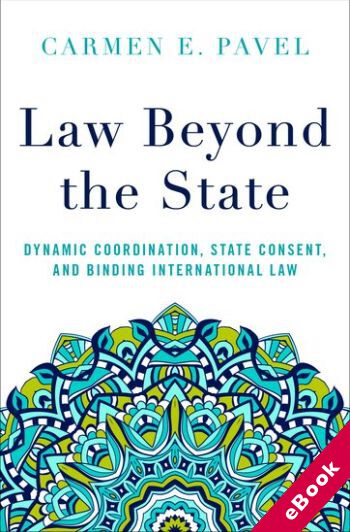We will be closed from 5pm Thursday 17th April for the Easter Bank Holidays, re-opening at 8.30am on Tuesday 22nd April. Any orders placed during this period will be processed when we re-open.

The device(s) you use to access the eBook content must be authorized with an Adobe ID before you download the product otherwise it will fail to register correctly.
For further information see https://www.wildy.com/ebook-formats
Once the order is confirmed an automated e-mail will be sent to you to allow you to download the eBook.
All eBooks are supplied firm sale and cannot be returned. If you believe there is a fault with your eBook then contact us on ebooks@wildy.com and we will help in resolving the issue. This does not affect your statutory rights.
Despite growing skepticism about the value of international law and its compatibility with state sovereignty, states should improve and strengthen international law because it makes a critical contribution to an international order characterized by peace and justice.
In recent years, international agreements and institutions have become particularly contentious. China is refusing to abide by the decision of an international arbitration decision implementing UNCLOS rules in the South China Sea, and Donald Trump has withdrawn the US from international agreements including the Paris Agreement on Climate Change of 2015. Such retreats expose widespread ambivalence towards cooperation through international law, and reverse the gains made by long-standing processes of legalization. In Law Beyond the State, Carmen Pavel responds to the ambivalent attitude states have with respect to international law by offering moral and legal reasons for them to improve, strengthen, and further institutionalize its capacity. She argues that the same reasons which support the development of law at the domestic level, namely the cultivation of peace, the protection of individual rights, the facilitation of complex forms of cooperation, and the resolution of collective action problems, also support the development of law at the international level.
The argument thus engages in institutional moral reasoning. Pavel shows why it should matter to individuals that their states are part of a rule-governed international order. When states are bound by common rules of behavior, their citizens reap the benefits. International law encourages states to protect individual rights and provides a forum where they can communicate, negotiate, and compromise on their differences in order to protect themselves from outside interference and pursue their domestic policies more effectively, including those directed at enhancing their citizen's welfare. Thus, Pavel shows that international law makes a critical, irreplaceable, and defining contribution to an international order characterized by peace and justice. At a time when challenges of cooperation beyond state boundaries include climate change, health epidemics, and large-scale human rights violations, Law Beyond the State issues a powerful reminder of the tools we have to address them.